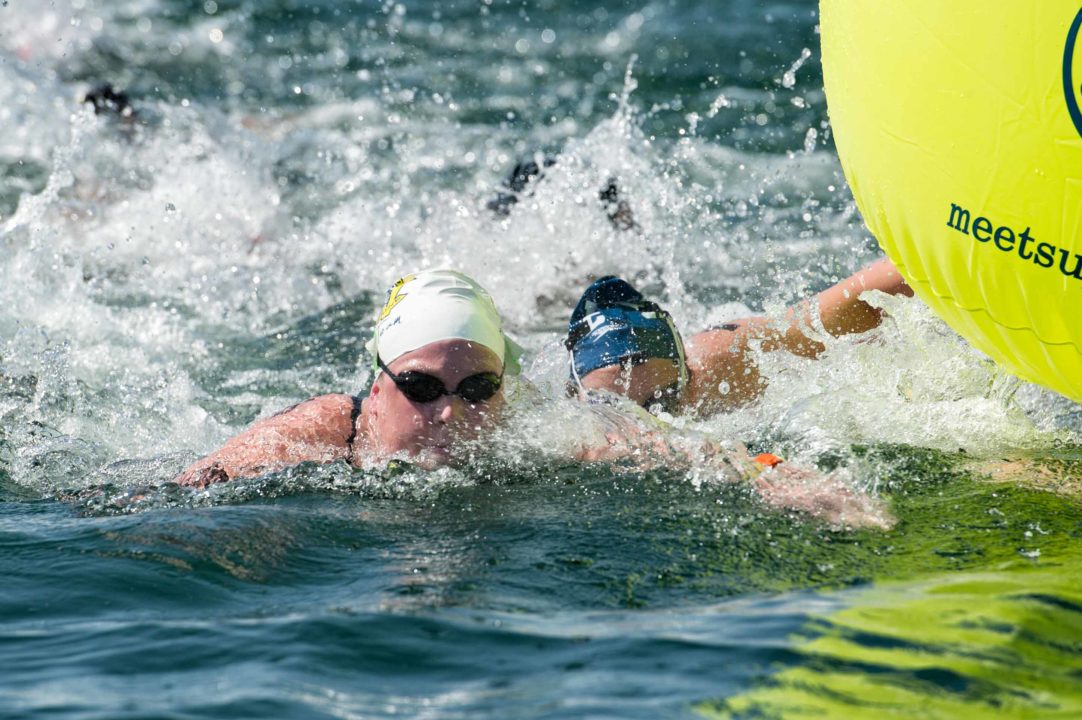To some, open water swimming and swimmers are a mystery. In an effort to better understand this side of our sport we’re asking national team athletes to share some of their perspective. First up is Emily Brunemann – she won the first two stops on this year’s FINA Open Water World Cup series, has an NCAA title, and 2 national pool titles.
What’s the biggest difference between open water swimmers and pool swimmers?
I think the biggest difference between open water and pool swimming is handling the external factors that are present in open water conditions. I think handling currents, sea life, waves, boats, other people, as well as many others definitely affects our stroke and rhythm. Learning how to swim in varying conditions is a skill that can only be mastered by experience.
What’s you’re #1 “rookie” mistake that you’ve made in your open water career?
My biggest rookie mistake actually happen to me at World Championships in 2009 in the 5k. This was my third open water race and my first international race, I was swimming next to another girl and instead of sighting I was basing my direction off her. A little while later I looked up and realized we were about 20 meters off course. By this time the lead pack was gone and I had to sprint my way back on the course and try to catch up with the lead group. I definitely learned to always sight and not base my swimming or direction solely on other swimmers.
Is there a different vibe at the start of an open water race versus standing behind the blocks before a pool race?
For myself there is a huge difference before and open water race versus standing behind the blocks at a pool race. Before an open water race I am more relaxed, I know it is a two hour race and have time to figure things out. I have gone into some races waiting until everyone goes before I go to stay away from the mayhem of the start and then work my way to the front. For me I feel with pool races I have to go from the beginning and do not have time to figure things out, this adds pressure to the races.
What’s the most insane set you’ve ever done in preparation for an open water race?
I would say when I was in California I did 3 x 3,000 long course descend 1-3. I don’t really do the crazy 20 x 1000 or anything like that I train with other milers so I typically train like a miler does, I think it is very important to work speed as well as endurance.
Where’s the most interesting place you’ve swam open water?
I really enjoyed swimming in the Caymen Islands for the Pirates Festival. We were swimming over sea turtles and other animals, I remember thinking I wanted to go and chase or play with the animals but had to remind myself I was in a race. I find the open water very majestic and peaceful, racing in it is very difficult but that is part of the fun!
What are you thinking about during a 10K race?
During a 10k there are many different things I am thinking about and it depends on where I am in the race. Feedings are always very interesting because a lot of people try to make moves around feedings so it is important to know where people are swimming. Understanding where people are throughout the race is something I have gotten a lot better at as well as figuring out if people may try to make a move, it is something I have worked on over this year. Due to the fact that there are a lot people in the race there is always someone trying to do something so it has been fun figuring those things out while I swim. I always go in with a race strategy but it a very fluid strategy because anything can happen in open water and you have to be prepared for anything. A lot of the time I am also just singing to myself!

Avoiding a mayhem may be a good tactic. Why to raise pulse and stress unnecessarily if it is not of vital importance in success. Besides, exposing yourself to such a congestion consumes valuable energy that is greatly needed later.
Hungarian swimmer, Katinka Hosszu, tried open water in South Africa a couple of months ago. She said she felt as though she had little control. But maybe the key to control on your race is, as Brunemann states, the sense that you have time to figure things out. If you don’t know exactly how much more meters are left or where every other competitor is exactly right now, don’t panic! It just consumes energy.